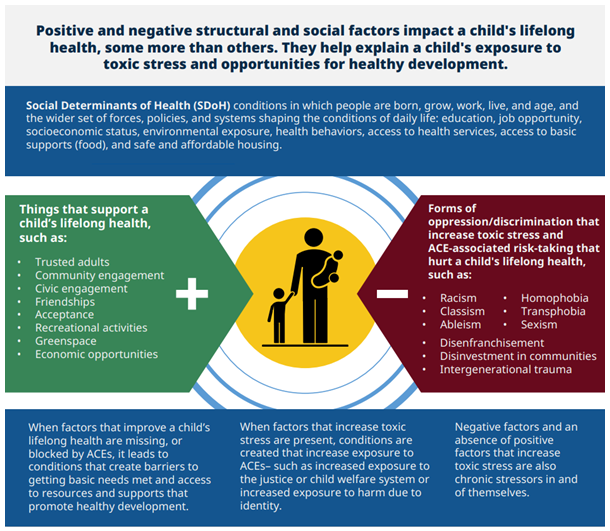About PCEs and ACEs
The data presented in this dashboard shows us a portion of the lived experience of Massachusetts residents. As you learn about PCEs and ACEs, and how to understand the data with a racial and health equity lens in this introduction, remember data provide only part of the story, while people’s lives tell us the entire story. With the addition of community voices, these data can be used to inform the actions that the Massachusetts Department of Public Health, its partners, and users of the dashboard take to promote health and equity in the Commonwealth.
Positive Childhood Experiences (PCEs) are things that children need to thrive. They are experiences that promote safe, stable, and nurturing relationships or environments in a child’s life. They exist within the household, neighborhood, or in the greater society. They include, but are not limited to, having an adult to talk to at home or at school, feeling safe within a home environment, or having opportunities to engage with a community, such as through neighborhood groups, sports and recreation, or faith-based organizations. PCEs increase the development of children’s physical, social, behavioral, and intellectual capacities to support healthy development. More information about PCEs can be found here.
Adverse Childhood Experiences (ACEs), on the other hand, are things that may happen in childhood that cause toxic stress throughout a person’s life. Toxic stress from these experiences affects the brain, how it develops, and how someone’s body will respond to stress in the future. ACEs can block healthy development in childhood. Previous research has linked toxic stress from ACEs to risk-taking behaviors (like substance misuse) and negative health outcomes in adulthood (like chronic health conditions or mental illness). Also, research has identified that a larger number of ACEs increases the risk of negative health outcomes in a dose-response relationship (learn more from the CDC).
PCEs, ACEs, and Health Equity
Identifying PCEs and ACEs as a score has been used in public health, social work, and other allied health professions to understand the impact of trauma on children. In these cases, context matters. Although PCEs and ACEs can be present in everyone’s lives, many forms of marginalization (see Figure 1 below) have created significant disparities among population groups, which are evident in the dashboard.
Click to View Full Image
Oppression impacts the social determinants of health (SDoH), which are things that help individuals and families thrive such as high-quality education, socioeconomic status, safe and affordable housing, among others. Learn more about PCEs and ACEs health equity.
We are all impacted by the social and structural policies and systems we live in, and despite the inequities that women and girls, people with disabilities, people with low income, BIPOC (Black, Indigenous, and People of Color), LGBTQIA+ (Lesbian, Gay, Bisexual, Transgender, Queer, Intersex, Asexual, plus), and immigrant individuals and families face, they are resilient in the face of adversity. Individuals and families are experts in their own lived experiences. Remembering this is especially important for people that are in positions where they support or have power over individuals that have experienced ACEs. Dismissing someone’s lived experiences causes harm. The data presented in this dashboard only shows us a part of these experiences, while people’s lives tell the entire story.
It is important to keep all of this in mind when interpreting the data.
PCEs and ACEs Dashboard
This dashboard shares selected data collected from surveys on PCEs and ACEs among Massachusetts residents by experience and their population groups. The different tabs show the results of Massachusetts resident survey responses for a topic and can be filtered by survey year, survey, population group, and experience.
Download the Dashboard User Guide for:
- support on how to navigate the dashboard.
- information about the data, including the data dictionary.
- information about the surveys, survey questions, and methodology.
- information about specific ACEs and PCEs topics.
- guidance on how to use a racial and health equity lens to interpret and use the data.
Additional resources or next steps to reduce ACEs and promote PCEs, can be found in the Additional Resources section below.
About the Surveys
The data included in this dashboard are from multiple Massachusetts survey sources that can be analyzed to estimate current youth experiences.
- The MA Youth Health Survey (YHS) collects data from students in randomly selected Massachusetts public middle and high schools in every odd-numbered year to assess the health of youth and young adults, including health status, risk behaviors, and protective factors.
- The MA Youth Risk Behavior Survey (YRBS) collects data from students in randomly selected Massachusetts public high schools in every odd-numbered year to monitor priority health risk behaviors among youth and young adults.
Importantly, these survey sources do not collect data from every Massachusetts resident in the given age range the survey sets out to sample. Statistical methodology is used to weight the collected data to statewide distributions of certain characteristics to present an estimated percentage for all residents in that given age range. For more information about the sampling and weighting methodology of the surveys, to view published reports and previous questionnaires, and to contact the survey programs, please use the links above for each survey.
Continue Exploring Racial and Health Equity Resources
- Framing Matters | CCIS: A subset of CCIS Webinar/User Guide “Framing Matters: How to read these findings with a racial justice lens”.
- Health Equity | ACEs Aware – Take action. Save lives.
- Racial Equity and School Health | Mass.gov: For educators and school nurses.
- Racial Equity Data Road Map | Mass.gov: A tool toward eliminating structural racism.
- Making the “C-ACE” | PMC (nih.gov): A Culturally-Informed Adverse Childhood Experiences Framework to Understand the Pervasive Mental Health Impact of Racism on Black Youth.
- Community Health Data Tool | Mass.gov
- Social Determinants of Health | Mass.gov
